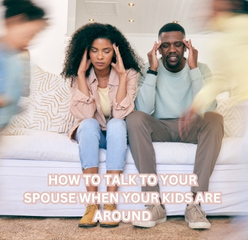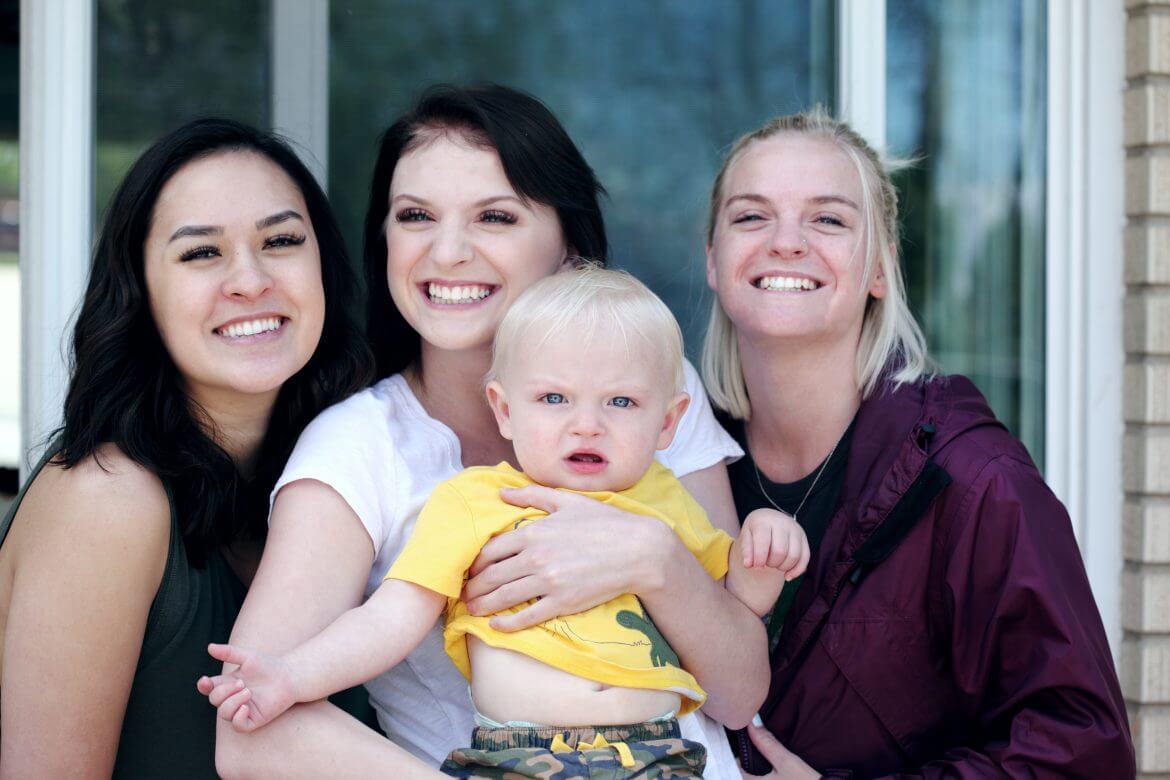Feeling like you’re in a parenting relay race and communication with your partner is the dropped baton? You’re not alone. If you’re deep in marriage with a newborn or have toddlers scaling the furniture, it’s easy to talk only in grunts and to-do lists.
READ: Marriage after a Baby: Keeping the spark alive (5 Tips)
This article unpacks how to actually connect even with small children around. I share research-based tips, unexpected ideas and insights from my work as a life coach (plus my own experience as a new mom who didn’t hit a relationship crisis, despite all the warnings).
Not everyone struggles but everyone needs a plan

When I had my first child, people kept warning me: “Just wait. The relationship strain is coming.”
But… it didn’t. My husband and I stayed solid. Sure, there were logistical hiccups and nights when we barely finished a thought but we didn’t lose the thread of “us.” I say this not to brag but because I think it’s important to show another reality: you can stay connected even in the busiest season.
As a certified transformational life coach, I also know that communication in marriage with young children doesn’t have to fall apart to need attention. Preventative care is underrated. Think of it like brushing your teeth. You don’t wait until you need a root canal.
Why communication gets weird after kids (even in “good marriages”)

1. Time shrinks. Priorities shift. Words vanish.
Once you become parents, conversations turn into logistics. You stop having those “Do you think aliens exist?” chats and instead say, “Did you pack extra wipes?” That’s normal but if that’s all there is, it gets lonely.
Work on it. Make one “non-kid” statement per day. Say something playful, weird, random. You’re still the same humans under the burp cloths.
2. One of you is often more exhausted or touched out
Uneven energy can create unintentional distance. One of you wants to talk, the other wants silence and a snack. That disconnect can feel personal when it’s not.
Use this phrase. “Not now but I want to circle back.” That way the tired partner doesn’t feel ambushed and the other doesn’t feel rejected.
3. You slide into roommate mode
You still love each other but the rhythm becomes businesslike. Talking turns into scheduling. Pickups, daycare, laundry, groceries. You stop being curious.
Start sending each other midday status check-ins. Just a simple message like “surviving” or “you crossed my mind.” It isn’t deep but it is enough to keep the signal alive.
Heads up. If you’ve thought any of these, keep reading
- “We only talk about our kid”
- “I miss us but don’t know what to say”
- “I’m scared we’re becoming strangers”
- “We don’t fight but we don’t connect either”
These thoughts are common…and fixable.
6 Things that help (even with a toddler screaming nearby)

1. The “First five minutes” rule
Whoever walks in the door (or comes back from putting the baby down) gives five minutes of undivided attention. No kid updates. No phones. Just look each other in the eye and talk.
Why this works. Research from the Gottman Institute shows that short, consistent moments of connection do more for relationship satisfaction than big gestures.
2. Ask smarter questions
Skip the dry “How was your day?” and go with something better:
“What frustrated you today?”
“What made you laugh, even a little?”
“Do you want to vent or hear suggestions?”
Just asking that last one can cut down on so many miscommunications.
3. Voice notes are quiet gold
Texting is slow. Talking face-to-face is rare. Voice notes are that in-between. They let you be real, unfiltered and human without demanding a reply on the spot. I love using these noise-canceling earbuds when I leave them. They help me speak freely, even during naptime.
One trick. Reply with, “Heard it. Will respond tonight.” It lets your partner know they’re not being ignored.
4. Make a “not tonight” list
Sit down together and decide which topics are banned after 9 p.m. It might be finances, in-laws, school stuff or anything else that leads to rabbit holes or tension.
Keep this list somewhere visible. I love using this magnetic fridge whiteboard. It’s a quiet way to say ‘not now, not never.’

5. Swap dinner talks for morning check-ins
Dinner conversations almost always get interrupted. Instead, try a short Sunday morning check-in. No food, no kids, no planning. Just ask:
“What’s one thing I did this week that helped you?”
“What’s one thing I could do next week that would help more?”
“What memory from this week do you want to hold on to?”
Fifteen minutes once a week is often more powerful than two hours of forced conversation.
6. Communication isn’t always verbal
Some of the most meaningful messages show up in actions. Filling their water bottle. Turning down their side of the bed. Starting the dishwasher before they ask. These moments say “I see you” more than words sometimes can.
Real life example that’s more common than you think
Nina and her partner didn’t argue after their baby was born but they also didn’t really talk. They weren’t mad. They just had no bandwidth. She grabbed a mini whiteboard like this from the garage and wrote: ‘Miss you. Let’s talk after the bedtime war?’. He added underneath: “Game on.” It wasn’t profound but it restarted the habit of speaking without an agenda.
Explore more while you’re here
Questions that open up to big conversations
FAQs about communication in marriage with young children

How do I stay emotionally connected to my partner with a newborn?
Make small, intentional touchpoints part of the routine. A back rub (we use this relaxing lavender massage oil), one full eye-contact moment, or simply saying ‘I appreciate you’ goes a long way.
Is it normal to feel distant in parenting and marriage?
Yes. That distance is often about exhaustion, not lack of love but it needs attention before it quietly turns into resentment.
What if I don’t want to talk at all some days?
That’s okay. Connection can come through presence. Watch a show together. Sit on the same couch. You don’t have to always be deep to be close.
Can communication get better if we’ve already drifted?
Yes. Couples often repair connection through consistent micro-efforts. Small actions that signal safety and interest.
Need extra support?
If this post hits home and you want help figuring out what comes next, I offer coaching for couples and individuals who are ready to feel more connected again. It’s not therapy. It’s strategic, creative and tailored to your life. Book a session here and we’ll build something that actually works for you.
Feeling like you’re in a parenting relay race and communication with your partner is the dropped baton? You’re not alone. If you’re deep in marriage with a newborn or have toddlers scaling the furniture, it’s easy to talk only in grunts and to-do lists.
This article unpacks how to actually connect even with small children around. I share research-based tips, unexpected ideas and insights from my work as a life coach (plus my own experience as a new mom who didn’t hit a relationship crisis, despite all the warnings).
Not everyone struggles but everyone needs a plan
When I had my first child, people kept warning me: “Just wait. The relationship strain is coming.”
But… it didn’t. My husband and I stayed solid. Sure, there were logistical hiccups and nights when we barely finished a thought but we didn’t lose the thread of “us.” I say this not to brag but because I think it’s important to show another reality: you can stay connected even in the busiest season.
As a certified transformational life coach, I also know that communication in marriage with young children doesn’t have to fall apart to need attention. Preventative care is underrated. Think of it like brushing your teeth. You don’t wait until you need a root canal.
Why communication gets weird after kids (even in “good marriages”)
1. Time shrinks. Priorities shift. Words vanish.
Once you become parents, conversations turn into logistics. You stop having those “Do you think aliens exist?” chats and instead say, “Did you pack extra wipes?” That’s normal but if that’s all there is, it gets lonely.
Work on it. Make one “non-kid” statement per day. Say something playful, weird, random. You’re still the same humans under the burp cloths.
2. One of you is often more exhausted or touched out
Uneven energy can create unintentional distance. One of you wants to talk, the other wants silence and a snack. That disconnect can feel personal when it’s not.
Use this phrase. “Not now but I want to circle back.” That way the tired partner doesn’t feel ambushed and the other doesn’t feel rejected.
3. You slide into roommate mode
You still love each other but the rhythm becomes businesslike. Talking turns into scheduling. Pickups, daycare, laundry, groceries. You stop being curious.
Start sending each other midday status check-ins. Just a simple message like “surviving” or “you crossed my mind.” It isn’t deep but it is enough to keep the signal alive.
Heads up. If you’ve thought any of these, keep reading
- “We only talk about our kid”
- “I miss us but don’t know what to say”
- “I’m scared we’re becoming strangers”
- “We don’t fight but we don’t connect either”
These thoughts are common…and fixable.
6 Things that help (even with a toddler screaming nearby)
1. The “First five minutes” rule
Whoever walks in the door (or comes back from putting the baby down) gives five minutes of undivided attention. No kid updates. No phones. Just look each other in the eye and talk.
Why this works. Research from the Gottman Institute shows that short, consistent moments of connection do more for relationship satisfaction than big gestures.
2. Ask smarter questions
Skip the dry “How was your day?” and go with something better:
“What frustrated you today?”
“What made you laugh, even a little?”
“Do you want to vent or hear suggestions?”
Just asking that last one can cut down on so many miscommunications.
3. Voice notes are quiet gold
Texting is slow. Talking face-to-face is rare. Voice notes are that in-between. They let you be real, unfiltered and human without demanding a reply on the spot. I love using these noise-canceling earbuds when I leave them. They help me speak freely, even during naptime.
One trick. Reply with, “Heard it. Will respond tonight.” It lets your partner know they’re not being ignored.
4. Make a “not tonight” list
Sit down together and decide which topics are banned after 9 p.m. It might be finances, in-laws, school stuff or anything else that leads to rabbit holes or tension.
Keep this list somewhere visible. I love using this magnetic fridge whiteboard. It’s a quiet way to say ‘not now, not never.’
5. Swap dinner talks for morning check-ins
Dinner conversations almost always get interrupted. Instead, try a short Sunday morning check-in. No food, no kids, no planning. Just ask:
“What’s one thing I did this week that helped you?”
“What’s one thing I could do next week that would help more?”
“What memory from this week do you want to hold on to?”
Fifteen minutes once a week is often more powerful than two hours of forced conversation.
6. Communication isn’t always verbal
Some of the most meaningful messages show up in actions. Filling their water bottle. Turning down their side of the bed. Starting the dishwasher before they ask. These moments say “I see you” more than words sometimes can.
Real life example that’s more common than you think
Nina and her partner didn’t argue after their baby was born but they also didn’t really talk. They weren’t mad. They just had no bandwidth. She grabbed a mini whiteboard like this from the garage and wrote: ‘Miss you. Let’s talk after the bedtime war?’. He added underneath: “Game on.” It wasn’t profound but it restarted the habit of speaking without an agenda.
Explore more while you’re here
Questions that open up to big conversations
FAQs about communication in marriage with young children
How do I stay emotionally connected to my partner with a newborn?
Make small, intentional touchpoints part of the routine. A back rub (we use this relaxing lavender massage oil), one full eye-contact moment, or simply saying ‘I appreciate you’ goes a long way.
Is it normal to feel distant in parenting and marriage?
Yes. That distance is often about exhaustion, not lack of love but it needs attention before it quietly turns into resentment.
What if I don’t want to talk at all some days?
That’s okay. Connection can come through presence. Watch a show together. Sit on the same couch. You don’t have to always be deep to be close.
Can communication get better if we’ve already drifted?
Yes. Couples often repair connection through consistent micro-efforts. Small actions that signal safety and interest.
Need extra support?
If this post hits home and you want help figuring out what comes next, I offer coaching for couples and individuals who are ready to feel more connected again. It’s not therapy. It’s strategic, creative and tailored to your life.Book a session here and we’ll build something that actually works for you.





